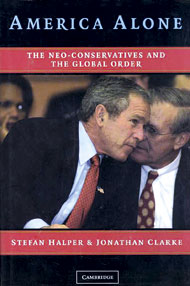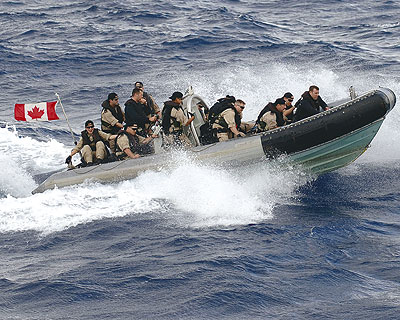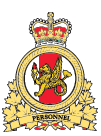 This information has been archived for reference or research purposes.
This information has been archived for reference or research purposes.
Archived Content
Information identified as archived on the Web is for reference, research or recordkeeping purposes. It has not been altered or updated after the date of archiving. Web pages that are archived on the Web are not subject to the Government of Canada Web Standards. As per the Communications Policy of the Government of Canada, you can request alternate formats on the "Contact Us" page.
Book Reviews
America Alone – The Neo-conservatives and the Global Order
by Stefan Halper
University of Cambridge and Jonathan Clarke, Cato Institute Cambridge University Press, 2004 339 pages, $25.68, Hard copy; $13.75, Paperback
Reviewed by Captain Pierre St-Amant
For more information on accessing this file, please visit our help page.
 The National Defence Headquarters library has just acquired a book that, if slightly outdated, nonetheless offers an interesting account of the way the Bush administration ignored American foreign policy traditions as it sank into the Iraq quagmire. The authors of America Alone, published in 2004, are both members of the U.S. conservative establishment, and they are broadly in agreement with the country’s interventionist policies. Their book is designed to convince influential readers of the need to straighten out America’s current foreign policy.
The National Defence Headquarters library has just acquired a book that, if slightly outdated, nonetheless offers an interesting account of the way the Bush administration ignored American foreign policy traditions as it sank into the Iraq quagmire. The authors of America Alone, published in 2004, are both members of the U.S. conservative establishment, and they are broadly in agreement with the country’s interventionist policies. Their book is designed to convince influential readers of the need to straighten out America’s current foreign policy.
The Iraq invasion has long been criticized by U.S. liberals, but theirs is a minority voice in the increasingly fragmented American political landscape. Recently, however, conservatives have also begun to question the campaign. America Alone offers a fresh look at the role of key players in current U.S. foreign policy. The authors, Stephan Halper of Cambridge University, and Jonathan Clarke of the Cato Institute, manage to avoid giving a platform to the fiercer anti-American critics while showing that some neo-conservatives have drifted away from the pragmatism of traditional conservative foreign policy. Thanks to a hefty dose of revisionism, the “neo-cons” have reshaped the heritage of Ronald Reagan to justify the unilateral action that led to the U.S. imbroglio in Iraq.
The book opens with a portrait of neo-cons as they appear on the political scene as an interest group in the 1960s, united around three common themes. First, they hold that issues of good and evil should be at the core of U.S. foreign policy, and that the United States possesses moral superiority. Second, they believe that military power determines relations between nations and that unilateral action by the United States is desirable. Finally, neo-cons see the Middle-East as the key locus of U.S. interests abroad. Halper and Clarke retrace the development of the neo-conservative ideology, including their influence on the policies of the Bush administration. Think tanks and publications funded by wealthy conservatives developed the neo-con ideology starting in the 1960s. Victory finally came with Ronald Reagan, and a number of neo-cons joined the administration, but soon became disillusioned with their champion’s pragmatism and retreated to their think tanks and academia. The multilateral approach adopted by George Bush Senior and Bill Clinton relegated neo-cons to the margins of power. Now, since the election of George W. Bush, a number of leading proponents of the neo-con ideology have returned to prominence in government circles. Nonetheless, despite the new President’s natural affinity with the neo-con ideology, and his alliance with the Christian right, the neo-cons’ desire for change was thwarted by Bush’s lack of interest in foreign affairs and the solid grip of Secretary of State Colin Powell. They felt let down by the foreign policy of George W. Bush, just as they had with Reagan. Of course, everything changed on 11 September 2001. The authors show how the neo-cons seized the opportunity offered by the emotional aftermath of the 9/11 tragedy and the President’s inexperience in international issues to advance their agenda. Within and outside government, they quickly advanced the military option as the only solution, even urging that Iraq be invaded before Afghanistan. President Bush’s Manichean world view clicked with their ‘good versus evil’ rhetoric. By questioning the patriotism of those who do not share their opinions, they have appropriated the iconic Reagan heritage for their own ideological ends. The authors criticize National Security Advisor and current Secretary of State Condoleezza Rice for failing to reconcile the contradictory viewpoints of the Pentagon and the State Department. They assert that if Rice had asked the right questions in order to present the President with a consensus, the weakness of intelligence on Iraq would have surfaced.
Finally, Halper and Clarke inventory the damage done by neo-cons to U.S. interests. They maintain that the unilateral military approach, based on the “you’re either with us or against us” principle, has completely isolated the United States from several important allies, forcing it to resort to bullying or corruption to garner support around the world. The rationalizations offered for the Iraq invasion, such as imaginary terrorist links or the weapons of mass destruction fiasco, have brought into question the integrity of the U.S. government. The deterioration of the security environment since the beginning of the “war against terror” shows that the neo-con agenda has only managed to make the world even more dangerous and the United States less capable of ensuring its security. The authors assert that terrorism cannot be eliminated exclusively by military force. History teaches us that terrorism withers only once social issues have been dealt with.
Readers who question the dominant position of the United States on the world stage will be disappointed by this book. However, America Alone does offer an interesting perspective on the current neo-con dominance in U.S. foreign policy.
![]()
Captain Pierre St-Amant, who works for Director General Military Careers, has just completed a bachelor’s degree as part of the Army’s university training program and has begun a specialization toward a master’s degree.

DND photo SL2006-0184-12
by Master Corporal Charles Barber, SNMG1
The Canadian Naval Boarding Party from HMCS Iroquois approaches the Spanish Tanker SPS Marques de la Eensenada.






